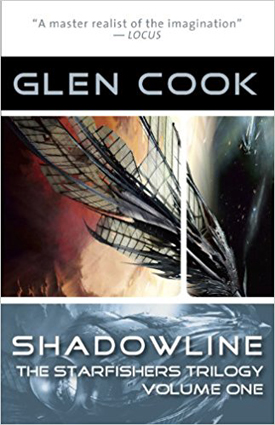 Glen Cook dedicated Shadowline, the first volume of his Starfishers trilogy, to Richard Wagner. Yes, that Richard Wagner. Think Götterdämmerung.
Glen Cook dedicated Shadowline, the first volume of his Starfishers trilogy, to Richard Wagner. Yes, that Richard Wagner. Think Götterdämmerung.
It’s hard to know where to start with this one. Let me give you a setting: the “now” is the thirty-first century, an interstellar civilization in which humanity is not the only species to deal with — although this is, without doubt, a story about humanity — a civilization that has its history, its resentments, its conflicts. It’s a time when a central government is beginning to exert its control over a far-flung empire — although it’s nowhere near that scale yet — that has pretty much made its own laws so far. There’s a planet, Blackworld, that has locked within it unimaginable riches, if anyone can ever exploit them: Blackworld’s sunward face is a burning hell of molten metal, its dark side is eternally frozen; in between lies the Shadowline, a cleft that allows access, of a sort, to the wealth of the sun-side. No one has ever run the Shadowline to its end, until one man, a near-derelict independent miner, does it.
Let me give you a cast of characters, starting with four men: Gneaus Julius Storm, commander of the Iron Legion, one of the two most effective mercenary legions in existence; Thaddeus Immanuel Walters, called “Cassius,” Storm’s second in command, and his father-in-law; Michael Dee, Storm’s half-brother, slippery, corrupt, and vindictive; Norbon w’Deeth, a Sangaree who has vowed to destroy the Storms. Add two more: Richard Hawksblood, commander of the other top mercenary legion, not a character so much as a presence, always offstage but always there; and Masato Igarashi Storm, youngest son, enrolled in the Naval Academy, an intelligence specialist, the man who tells the story. Add into the mix Pollyanna Eight, married to Storm’s son Lucifer, available to any man, and with her own agenda.
Let me give you a motivation: Boris Storm, Gneaus’ father, once led a raid on the Sangaree world Prefactlas, wiping out every House establishment on the planet and freeing the slaves — human slaves. There was one survivor of House Norbon, Deeth, a child, but a Sangaree. The Sangaree don’t forget, and they believe in Family, and they believe in vendetta. And Deeth had time.
It’s been a long while since I’ve read Shadowline. It impressed me way back when, and impresses me even more now, no doubt because, in the natural course of things, I’ve become a more sophisticated audience. Like any truly exceptional work of art, whether high art or vernacular, it’s hard to pin down: there are too many levels of experience here for simple descriptions. One can point to the way Cook has built back story into the narrative, making the scene-setting into a coherent and absorbing tale in itself that blends without a hitch into the present action. One can point to the mesmerizing prose, lean, sharp, direct. One can point to the characters, fully realized, vital people, larger than life, of course, but they’re fictional heroes — they also happen to be the Norse gods, almost the entire pantheon, nearly as I can figure out, in near-human scale. One can point to the richness of detail, the little grace notes and subtleties that mark a consummate craftsman. And even then, there’s an elusive quality to this book that draws you in again and again, and once you’re there, you don’t want to leave.
It resonates. That’s the only way I can think to name it. That spare prose builds indelible images that tie into images we are probably already carrying with us — one-eyed Gneaus Storm stalking the corridors of the Fortress of Iron, his great Sirian warhounds at his heels, ravenshrikes on his shoulders; or Gneaus conversing with his not-really-dead daughter, her brain captive in cold, dark Festung Todesangst, the known galaxy’s main information storage and retrieval station (it’s not only the Norse myths involved here, but that one does double duty); or bright shining Benjamin Storm, beloved of all, struck down during a game to show off his invulnerability by his twin Homer, blind and crippled. We’re reading several stories here, colored by Cook’s own world-weary view of human frailty, honor, and our own consciences running headlong into the necessities of survival.
There’s a strong element of what I call “darkness” and what Cook calls “creeping realism” in this story. It’s not a happy ending — it’s Ragnarok, after all. There are survivors, but no winners. It’s also a revenge saga. It doesn’t end here.
(Night Shade Books, 2010 [orig. 1982])
